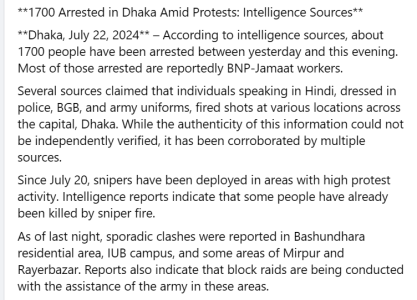In Bangladesh, protests are no longer about the quota system
It has been more than 10 days now since the start of the protests against a government job quota system. Students and youth across the country have been demonstrating against what they see as an unfair policy favouring a certain group – children of “freedom fighters” in the Bangladesh war of independence. But after the government unleashed unprecedented violence, the protests have gone beyond the demand for cancellation of the quota system.
A list of demands by students has been circulated in an underground press release.
1) The prime minister must accept responsibility for the mass killings of students and publicly apologise.
2) The home minister and the road, transport and bridges minister [the latter is also the secretary general of the Awami League], must resign from their [cabinet] positions and the party.
3) Police officers present in the sites where students were killed must be sacked.
4) Vice Chancellors of Dhaka, Jahangirnagar and Rajshahi universities must resign.
5) The police and goons who attacked the students and those who instigated the attacks must be arrested.
6) Families of the killed and injured must be compensated.
7) Bangladesh Chhatra League [BCL, the pro-government student wing, which is, effectively, the government’s vigilante force] must be banned from student politics and a student union established.
8) All educational institutions and halls of residences must be reopened.
9) Guarantees must be provided that no academic or administrative harassment of protesters will take place.
That Prime Minister Sheikh Hasina publicly apologises for her disparaging comments about the protesters may seem a minor issue, but will surely be the sticking point.
This prime minister is not the apologising kind, regardless of what she does. Regardless of the allegations that she has rigged elections, regardless of the fact that corruption has been at an all-time high during her tenure, regardless of the fact that more than 100 students and other protesters have been murdered by her goons and the security forces, regardless of the fact that she has deemed all those who oppose her views to be “razakars” (collaborators of the Pakistani occupation army in 1971).
There is certainly not anyone in the negotiating camp who would have the temerity to even suggest such a course for the prime minister. There is a Bangla saying, “You only have one head on your neck.”
The ministers do the heavy lifting. They control the muscles in the streets and “manage” things when resistance brews. The ministers are high-ups in the party, and apart from the difficulty of finding suitable replacements, discarding them would send out the wrong message within the party.
Vice chancellors and proctors having to resign is an easy one. These are discardable minions. The perks are attractive and there are many to fill the ranks. The police being dumped is not as easy, as they provide some of the muscle, but “friendly fire” does take place.
Compensation is not an issue. State coffers are there to be pillaged and public funds being dispensed at party behest is a common enough practice.
The demand to ban BCL and associated student organisations in Dhaka, Jahangirnagar and Rajshahi universities is a sticking point, as they are the ones who keep the student body in check and are the party cadre called upon when there is any sign of rebellion. It is a vigilante group that can kill, kidnap or disappear at party command. For a government that lacks legitimacy, these are the foot soldiers who terrorise and are essential parts of the coercive machinery.
Educational institutions being reopened is an issue. Students have traditionally been the initiators of protests. With such simmering discontent, this would be dangerous, particularly if the local muscle power was clipped. The return of independent thinking is something all tyrants fear. The cessation of harassment is easy to implement on paper. It is difficult to prove and can be done at many levels. Removing the official charges will leave all unofficial modes intact.
Of all these demands, the apology is the least innocuous, but perhaps the most significant. It will dent the aura of invincibility the tyrant exudes. She has never apologised for anything.
Not for her father Sheikh Mujibur Rahman setting up the Rakkhi Bahini, the paramilitary force which rained terror on the country. Not his setting up of Baksal, the one-party system where all other parties and all newspapers, except the four approved ones, were banned. Not the numerous extrajudicial killings and disappearances and the liturgy of corruption by people in her patronage during her own tenure.
An apology to protesting students, while simple, would be a chink in her armour she would be loathe to reveal.
Ironically, her father and the Awami League led the resistance against the Pakistani army during the genocide of 1971. The revolutionaries have now become our new occupiers. They insist Bangladesh is still a “democracy”.
By now, the body count is impossible to verify. I try to piece things together from as many firsthand reports as I can. Many of the bodies have a single, precisely targeted bullet hole. Pellets are aimed at the eyes.
International news, out of touch as the internet has been shut down and mobile connectivity severely throttled, say deaths are more than 100. Those monitoring feel that these numbers are a significant underestimate of the dead and missing. Government news report even fewer.
Staff at city hospitals are less tight-lipped and can give reasonably accurate figures, but not all bodies go to hospital morgues. An older hospital in Dhaka did report more than 200 bodies being brought in. The injured who die on the way to the hospital are not generally admitted. Families prefer to take the body home rather than hand them over to the police. Bodies are also being disappeared.
Police and postmortem reports, when available, fail to mention bullet wounds. The body of my former student Priyo was among the missing ones, but we were eventually able to locate him. A friend took him back to his home in Rangpur to be buried. Constant monitoring and checking by activists resulted in the bullet wound being mentioned in his case, though a deliberate mistake in his name in the hospital’s release order that was overseen by a police officer attempted to complicate things. Fortunately, it was rectified in the nick of time.
Getting the news out has become extremely difficult. This piece is going out through a complicated route. I have deleted all digital traces to protect the intermediaries.
The entire internet network has been brought down; a junior information technology minister has said that this is due to the “unstable situation”.
Helicopters fly low, beaming searchlights downwards. There have been reports of shots fired at people. Tear gas and stun grenade shells become lethal when dropped from a height.
A student talks of a body lying on the empty flyover being dragged off by the police. A friend talks of an unmarked car spraying bullets at the crowd as it speeds past. She was lucky. The shooter was firing from a window on the other side. A mother grieves over her three-year-old senselessly killed.
A gory report of a human brain congealed on a tarmac is a first for me. The curfew has resulted in rubbish being piled up on the streets. The brain will be there for people to see, perhaps deliberately.
The raid at 2:20 earlier this morning in the flat across the street was also in commando fashion. The video footage is blurry, but one can only see segments of the huge contingent of the Rapid Action Battalion (RAB), heavily armed police and others in plainclothes. They eventually walked out with one person, perhaps an opposition leader.
Armoured personnel carriers prowl the streets. Orders to shoot on sight have not quelled the anger and people are still coming onto the streets despite the curfew. There is the other side of the story. Reports of policemen being lynched and offices being set on fire are some of the violent responses to the government-led brutality.
Then there is the impact of the protests on the average person, as most working-class Bangladeshis live day-to-day. Their daily earnings feed their families. As a prime minister, who desperately clings on to a position she does not legitimately have the right to, and a public, who have been tormented enough, to battle it out, they are the ones who starve.
Private TV channels vie with the state-owned BTV and churn out government propaganda. As I watch members of the public complain on one, I am unable to forget all the average people I spoke to – the rickshaw drivers, and even fruit sellers with perishable goods – who expressed solidarity with the students. Their immediate suffering, though painful, is something they are willing to accept.
She has to go, they say.
Source: Al Jazeera













